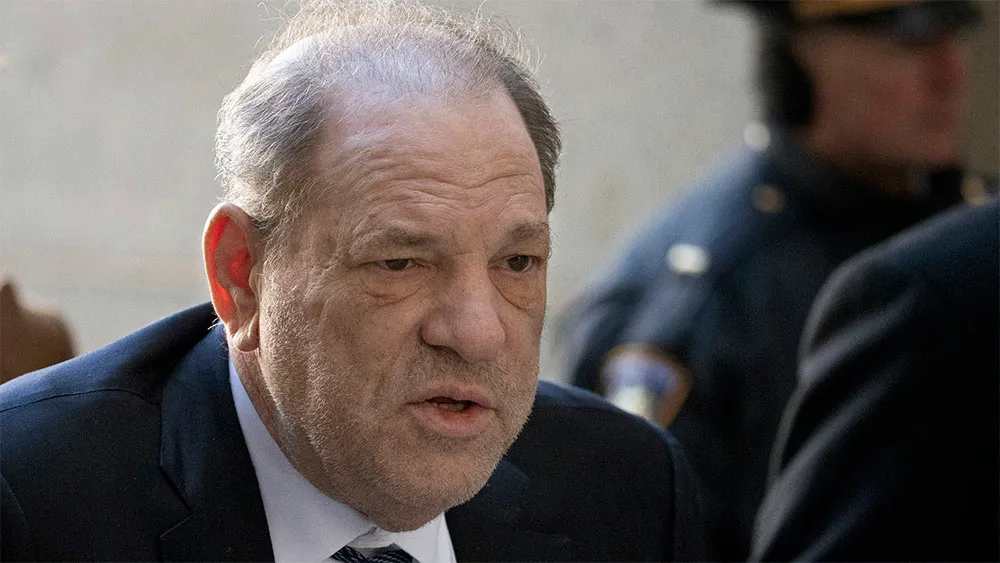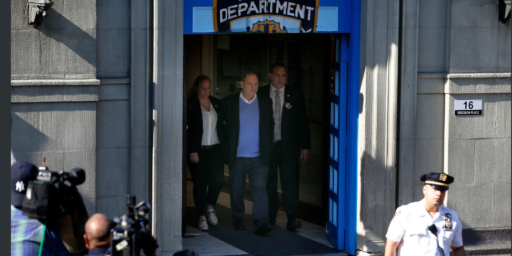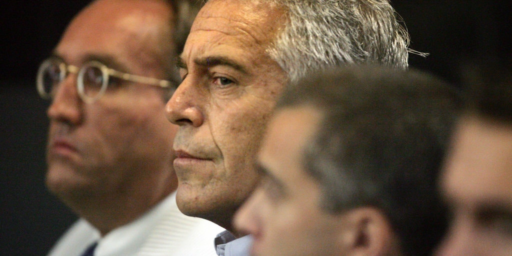Harvey Weinstein’s New York Conviction Overturned
He's still a convicted felon in California, though.

NYT (“Live Updates: Harvey Weinstein’s Conviction Is Overturned by New York’s Top Court“):
New York’s highest court on Thursday overturned Harvey Weinstein’s 2020 conviction on felony sex crime charges, a stunning reversal in the foundational case of the #MeToo era.
In a 4-3 decision, the New York Court of Appeals found that the trial judge who presided over Mr. Weinstein’s case had made a crucial mistake, allowing prosecutors to call as witnesses a series of women who said Mr. Weinstein had assaulted them — but whose accusations were not part of the charges against him.
Citing that decision and others it identified as errors, the appeals court determined that Mr. Weinstein, who as a movie producer had been one of the most powerful men in Hollywood, had not received a fair trial. The four judges in the majority wrote that Mr. Weinstein was not tried solely on the crimes he was charged with, but instead for much of his past behavior.
Now it will be up to the Manhattan district attorney, Alvin L. Bragg — already in the midst of a trial against former President Donald J. Trump — to decide whether to seek a retrial of Mr. Weinstein.
“It is an abuse of judicial discretion to permit untested allegations of nothing more than bad behavior that destroys a defendant’s character but sheds no light on their credibility as related to the criminal charges,” Judge Jenny Rivera wrote on behalf of the majority.
When reached by phone, Arthur Aidala, Mr. Weinstein’s lawyer, said, “This is not just a victory for Mr. Weinstein but for every criminal defendant in the state of New York, and we compliment the Court of Appeals for upholding the most basic principles that a criminal defendant should have in a trial.”
Spokeswomen for the Manhattan district attorney’s office did not immediately respond to a request for comment.
It was not immediately clear on Thursday morning how the decision would affect Mr. Weinstein, 71, who is being held in an upstate prison in Rome, N.Y. But he is not a free man. In addition to the possibility that the district attorney’s office may try him again, in 2022, he was sentenced to 16 years in prison in California after he was convicted of raping a woman in a Beverly Hills hotel.
The result strikes me as obvious. One would think a judge assigned to a case this high-profile would be smarter than this.
Jodi Cantor (“Harvey Weinstein’s conviction was fragile from the start“) agrees:
The overturning of Harvey Weinstein’s New York sex crimes conviction on Thursday morning may feel like a shocking reversal, but the criminal case against him has been fragile since the day it was filed. Prosecutors moved it forward with risky, boundary-pushing bets. New York’s top judges, many of them female, have held rounds of pained debates over whether his conviction was clean.
Outside the justice system, evidence of Mr. Weinstein’s sexual misconduct is overwhelming. After The New York Times revealed allegations of abuse by the producer in 2017, nearly 100 women came forward with accounts of pressure and manipulation by Mr. Weinstein. Their stories sparked the global #MeToo reckoning.
But while Mr. Weinstein’s alleged victims could fill an entire courtroom, few of them could stand at the center of a New York criminal trial. Many of the horror stories were about sexual harassment, which is a civil violation, not a criminal one. Others fell beyond the statute of limitations. One of the original accusers was dropped from the trial because of allegations of police misconduct.
Manhattan prosecutors, under pressure for not pursuing charges earlier, made a series of gambles.
First, they proceeded with a trial based on only two victims, who accused him of sexually assaulting them but also admitted to having consensual sex with him at other times — a combination that many experts say is too messy to win convictions. To prove their case against Mr. Weinstein, who denies all allegations of non-consensual sex, the prosecutors had little concrete evidence.
So to persuade the jury, the lawyers turned to a controversial strategy that would ultimately lead to the conviction’s undoing. They put additional women with accounts of abuse by Mr. Weinstein — so-called Molineux witnesses — on the stand to establish a pattern of predation. The decision seemed apt for the moment: In a legal echo of the #MeToo movement, Mr. Weinstein was forced to face a chorus of testimony from multiple women.
The women’s testimony was searing, and when Mr. Weinstein was convicted in 2020, and then sentenced to 23 years in prison, it looked like the prosecutors had expanded the possibilities for holding sex offenders accountable.
“I did it for all of us,” Dawn Dunning, who served as a supporting witness in the trial, said in an interview afterward. “I did it for the women who couldn’t testify. I couldn’t not do it.”
But the move also risked violating a cardinal rule of criminal trials: Defendants must be judged only on the acts they are being charged with.
That became the main basis for Mr. Weinstein’s repeated appeals of his conviction. For years, his lawyers have argued that his trial was fundamentally unfair, because it included witnesses who fell outside the scope of the charges. In addition to the alleged sexual assault victims, prosecutors brought in character witnesses who portrayed Mr. Weinstein as a capricious, cruel figure.
In 2022, a New York appeals court dismissed those concerns and upheld his conviction, after a vigorous debate by the judges. They wrote that the testimony from the additional witnesses had been instrumental in showing that the producer did not see his victims as “romantic partners or friends,” but that “his goal at all times was to position the women in such a way that he could have sex with them, and that whether the women consented or not was irrelevant to him.”
This February, when New York’s highest court heard the producer’s latest and final appeal, the proceedings did not garner much attention. But they felt quietly dramatic: Seven of the state’s highest judges, four of them women, were debating whether the man whose alleged offenses formed the cornerstone of the #MeToo movement had been treated fairly in court.
Today the court decided, with a majority that included three female judges, to throw out the conviction and order a new trial. Mr. Weinstein remains convicted in California and will be moved to prison there.
“We conclude that the trial court erroneously admitted testimony of uncharged, alleged prior sexual acts against persons other than the complainants of the underlying crimes,” the judges wrote in their decision on Thursday.
“No person accused of illegality may be judged on proof of uncharged crimes that serve only to establish the accused’s propensity for criminal behavior,” the opinion continued.
That the decision was only 4-3 is more of the same problem that led to this result: judges bending over backward to punish Weinstein for being a despicable human being. Alas, that’s not against the law.
Given that Weinstein is 72 and has a long sentence waiting for him in California—and that prosecutors thought this gambit was the only way to convict him in New York—it may well be prudent to simply let him rot away there.





Not good for #MeToo. I can picture guys in suits all over the country breathing a sigh of relief and wondering if now, finally, they can grab their personal assistants by the pussy.
I don’t want to read too much into this, but taking the high-flying drone view, I don’t like the way the front line is moving. The Left no longer holds the initiative. We’re the Ukrainians in this scenario, losing ground, hoping we can still stop a breakthrough, and maybe we can, but retaking lost ground will be a long, hard slog.
Was Harvey Weinstein a terrible guy? Sure, but he was held up by an entire system. He committed actual crimes and was a violent and cruel man, and people supported that behavior up until the point at which the very thin veil was pulled back, and then he had to go.
As far as the judges bending over backwards, they treated him like a common criminal after the law was forced to go after him. He just had the money to fight this treatment.
Two things:
1) His conviction in California hasn’t been overturned, so he remains in prison where he belongs.
2) NY Prosecutors may decide to retry the case. This is not an easy decision, especially for the victims who would have to take the stand again. So this one is far less certain.
I think chances are still good he’ll rot in prison.
It seems to me that the fact that Weinstein was a deplorable human being would simply corroborate the charges against him. If that’s not how NYS law works, so be it. Congratulations to Mr. Weinstein for once again demonstrating “if you get the right lawyer, we have the best criminal justice system in the world.”
Since when must defendants be judged “only for the acts they are charged with”? I thought the whole point of a “character witnesses” was to establish context for the actual charges. If I testify under oath that I saw someone commit an act, why does it matter whether formal charges for that act were ever pressed? Either I’m lying or I’m not — that’s for the jury to decide (and any prosecutor who’d like to pursue a perjury charge). And when there are 20 others who saw similar acts… the idea that this is not admissible evidence is mind-boggling.
“Your honor, the defense concedes that Mr. Slashem dismembered 417 other small mammals over the past three years, but surely that has nothing to do with whether he dismembered Fido, as alleged…”
@DrDaveT:
A: When defendants are wealthy and well-connected.
As Modulo Myself notes, it’s not uncommon for our courts to treat people unfairly, deeming them horrible based on a disfavored identity like being poor and underresourced. Cases with such defendants are typically ajudicated more harshly.
That the courts gave unfair treatment to someone as rich and powerful as Weinstein was actually an example of equal justice. The difference here is Weinstein, like Cosby, had the wherewithal to keep fighting.
R. Kelly next?
@DrDaveT:
Usually, prosecutors aren’t allowed to call character witnesses, just the defense. Cornell’s LII:
As to
Indeed, it does not.
See also: “I shot the sheriff but I did not shoot the deputy.”
@DrDaveT: Still, the previous acts do not prove that Mr. Slashem dismembered Fido but may bias them to disregard evidence that he didn’t. It’s still a variation on Ed “innocent people don’t get arrested” Meese’s wisdom, or lack thereof. But I’m agnostic on this; New York can have whatever laws it prefers, and you can believe those laws are wanting if you wish.